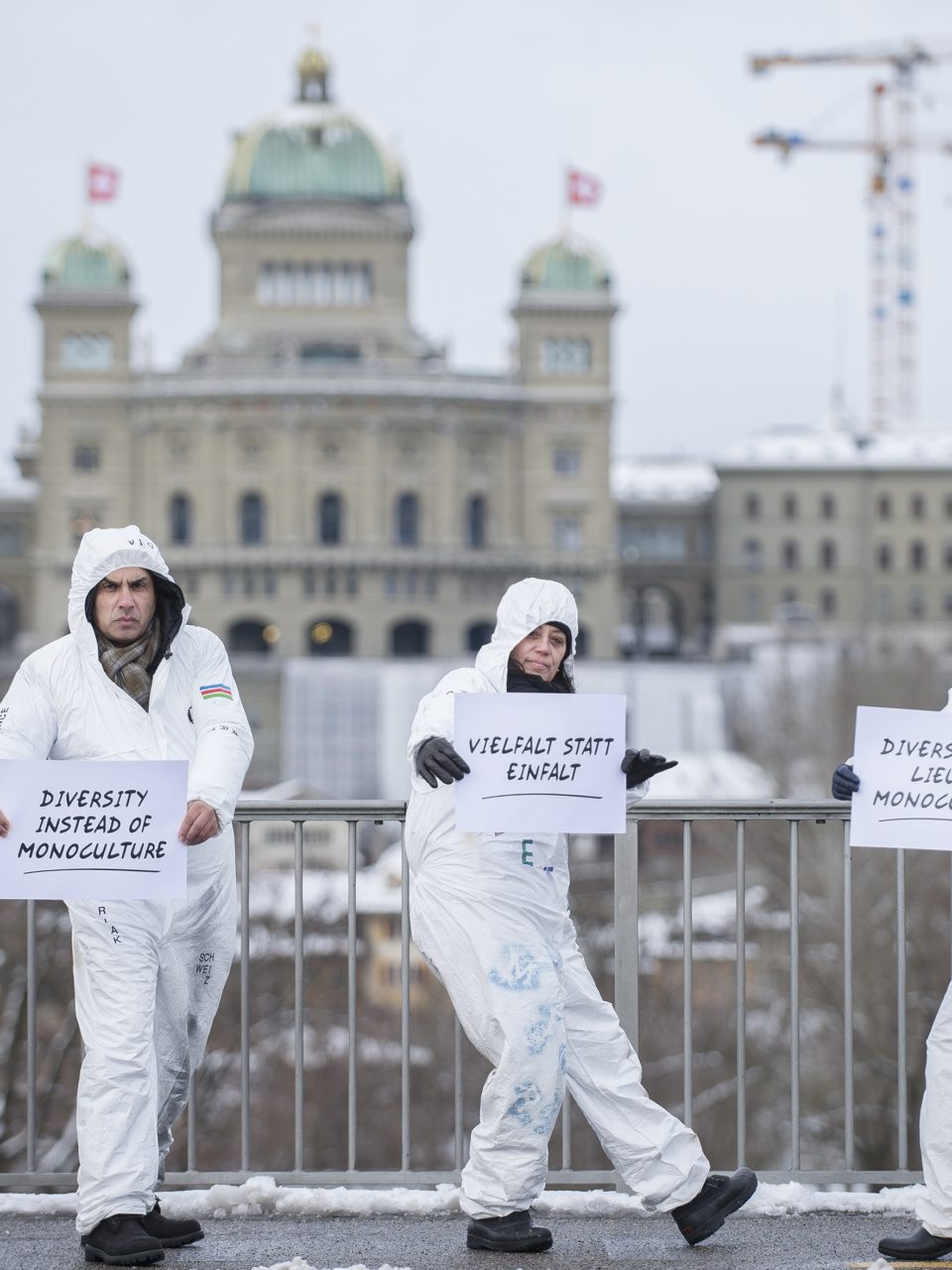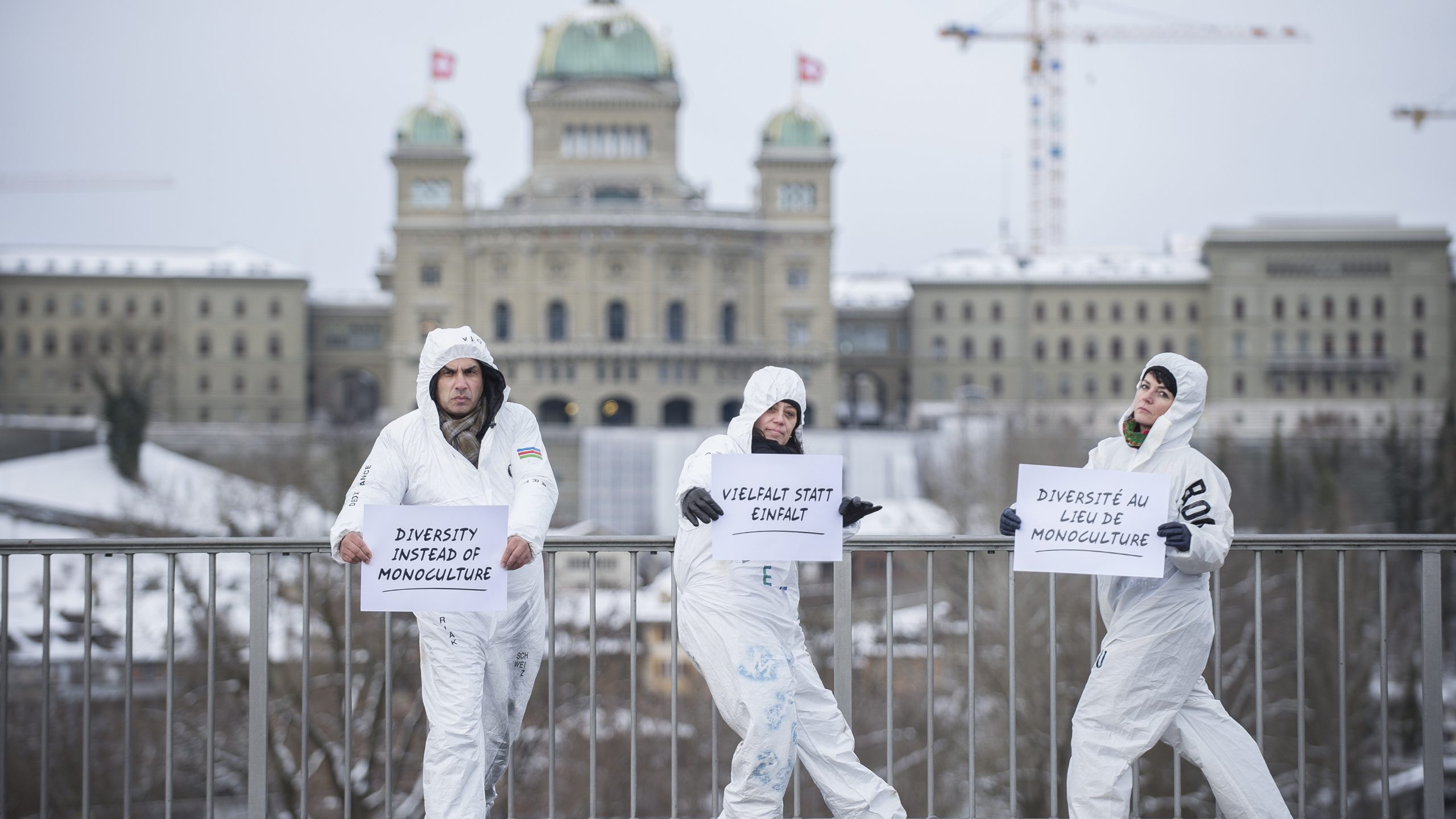Our commitment to Roma, Sinti and Yenish
The Society for Threatened Peoples, together with representatives of the Roma, Sinti and Yenish, campaigns for their rights to be guaranteed in Switzerland. Their campaign "Stop Antiziganism" is committed to increasing respect and recognition as well as reducing prejudice and discrimination.
Note: Due to the thematic focus, the STP is within this campaign currently limited to a watchdog function on antiziganism and selectively on questions of stopping places for travelling communities.
In 1998, Switzerland ratified the Council of Europe’s Framework Convention for the Protection of National Minorities. To date in Switzerland, minority linguistic groups such as Yenish, Sinti and Manouches as well as members of the Jewish community are recognized as national minorities. A request for recognition of the Roma as a national minority is currently under consideration.
The STP and its partner organizations note that action is still required on the Framework Convention if it is to be successfully implemented in Switzerland. Both the Sinti and the Yenish as well as the Roma are, although for centuries part of Swiss reality, treated as foreign bodies and are exposed to institutionalized discrimination, prejudice and racism.
Problem areas: politics, media, education and policing
For the ominous combination of institutionalised discrimination and cultural stigmatization of Roma, Sinti and Yenish, the term "antiziganism" has been developed in history and the social sciences. The focus is on the following problematic areas:
- In many media there is generalized and biased reporting, in which Roma, Sinti and Yenish have little say on the matter.
- Especially in the last few years, there has been an increase in the number of discriminatory and racist comments made publicly against Roma, Sinti and Yenish - even by politicians.
- All three minorities face an above-average number of police checks and are subject to unnecessary harassment.
- The lack of pitches and transit sites prevents the travelling minority groups from maintaining and developing their cultural lifestyle.
- The political involvement of the three minorities is inadequate.
The history and cultures of the Roma, Sinti and Yenish are hardly taught in Swiss schools. In particular, the imparting of the problematic Swiss "gypsy policy" of the past is not a compulsory subject. The consequence of this lack of knowledge is that stereotypes and prejudices still continue, even now, to be passed on without questioning these unjustified views.
This is what the STP does
Together with representatives of the Roma, Sinti and Yenish, the STP campaigns against antiziganism and for equality. Thus, the STP coordinates joint campaigns for more respect and recognition. On a political level, the STP campaigns with statements, interventions and lobbying for their rights. Finally, the STP sensitizes via public and media relations for the situation of the Roma, Sinti and Yenish in Switzerland and reminds people of the impact of the Swiss "Gypsy policy". In addition, the STP co-initiated the Swiss Confederation's action plan for Yenish, Sinti and Roma and participated in the meetings in an advisory capacity. The STP will accompany the implementation of the action plan with a critical eye.
Yenish and Sinti in Switzerland
The Yenish and Sinti in Switzerland have recently been able to record important successes. The Society for Threatened Peoples has supported them along the way.
In Switzerland, there are 35,000 Yenish, 2,000 to 3,000 of whom are actively travelling. In addition, there are several hundred Sinti with a mostly travelling lifestyle. For them, 2016 was a good year: on the occasion of the Feckerchilbi in Bern, Federal Councillor Alain Berset spoke the words long awaited for by the two minorities: in future, Yenish and Sinti are no longer to be referred to by the vague term "Travellers", but by their own names. They have thus achieved their goal of being recognized as national minorities in Switzerland.
Coming to terms with the past
The minorities, together with the STP, also achieved success where coming to terms with the past in an official capacity is concerned. In 2016, the Federal Council reaffirmed in its reply to an interpellation of Barbara Gysi (SP) to commemorate the victims of the "Aid Organisation for Children of the Country Road", that the memory of the problematic aspects of our history must be maintained. Therefore, the Federal Council is ready to consider supporting a third party's effort to erect a memorial. Between 1926 and 1972, the "Aid Organisation for Children of the Country Road" removed around 600 children from their Yenish parents to "eradicate" the Yenish culture.
During the Second World War, persecuted Yenish, Sinti and Roma were not accepted in Switzerland - many of them died in concentration camps. Until 1972, the Swiss border was closed to foreign "gypsies", and until 1990 the Swiss Federal Department of Justice and Police had a "Gypsy Register", in which all apprehended Roma, Sinti and Yenish in Switzerland were registered with fingerprints and photographs.
More pitches and transit sites
The lack of pitches and transit sites for the travelling Yenish, Sinti and Roma has increased in the last 15 years. This leads to the fact that those affected can only maintain and develop their travelling way of life under difficult conditions. The STP will continue to support all the travelling minorities, so that enough sites can be created.

Alain Berset, federal council member, visited the 2016 Feckerchilbi, a traditional meeting of Yenish and travellers, in Bern. Photo: Andreas von Gunten / Picture library Radgenossenschaft
Roma in Switzerland
It is estimated that around 80,000 to 100,000 Roma are living in Switzerland. Hardly anyone knows who they are. And when they reveal themselves, they still encounter prejudices and open racism.
"As a Roma you live well in Switzerland, as long as you are not outed." This sentence is the start of a testimonial video of Swiss Roma produced by the STP in regards to the International Day of Roma on 8 April 2017. The Roma have been resident in Switzerland for 600 years. They have their own culture and language, they are well integrated and most of them hold Swiss citizenship. But prejudices and stereotypes are still passed on without questioning this unjustified attitude. Thus, racist comments against Roma in politics and in public are growing; the media still report mainly in a generalizing way; Roma are often arbitrarily stopped and checked by the police. And coming to terms with the history of the Roma in Switzerland in an official capacity, the former being characterized by exclusion and rejection, is still pending.
Waiting for recognition
The draft of the Action Plan of the Federal Council under the leadership of the Federal Office of Culture to improve the situation of Yenish, Sinti and Roma from the end of 2016 for the first time recognizes the Roma as part of the cultural diversity of Switzerland. Similarly, the Confederation acknowledges its obligation to ensure conditions which allow the Roma to live a lifestyle appropriate to their culture. At the same time, the Federal Council is willing to consider the issue of recognition of Romani as a non-territorially rooted language within the meaning of the European Language Charter in the next periodic report. Nevertheless: the recognition of the Roma in accordance with the Council of Europe's Framework Convention for the Protection of National Minorities is still pending. To this end, Roma organizations submitted a petition to the Directorate for International Law in 2015.
Racist statements are increasing
From the political side, the STP and the Roma organizations are observing an increase in racist statements against Roma. For example, in 2016, the STP, together with the Roma organizations, filed twice against two politicians for violating the racist criminal code. The STP calls for politicians and governments to condemn racist statements against Roma with the same level of clarity as they are rightly doing in the face of racist comments against other minorities in Switzerland.
Reappraisal of history
The relationship between Switzerland and the Roma community is characterized by centuries of exclusion and rejection. Until 1972, the Swiss border was closed to foreign "gypsies", and until 1990 the Swiss Federal Department of Justice and Police had a "Gypsy Register", in which all apprehended Roma, Sinti and Yenish in Switzerland were registered with fingerprints and photographs. During the Second World War, persecuted Yenish, Sinti and Roma were not accepted in Switzerland - many of them died in concentration camps. A public review of this gloomy chapter in Swiss history is still pending. The result is that stereotypes and prejudices continue to exist in the present. With its public and media relations, the STP and its partners want to ensure that the Swiss "Gypsy policy" becomes known and is part of the compulsory curriculum.
Roma Holocaust
Worldwide, the 27th of January is observed as International Holocaust Remembrance Day. This day marks the anniversary of the liberation of the concentration camp Auschwitz-Birkenau in 1945. A frequently forgotten aspect is that thousands of Roma were also persecuted in the Nazi era. At least 500,000 Roma and Sinti were systematically murdered during the Second World War. In one night alone, from the 2nd to the 3rd of August 1944, almost 3000 people died in the liquidation of the so-called "Gypsy Camp" within the Auschwitz II-Birkenau concentration camp.
For this reason, the European Commission declared the 2nd of August to be Roma Holocaust Memorial Day in 2015. In 2017, the STP supported a motion that called for Switzerland to recognize this day as well – and thus to take a stand against forgetting the Roma Holocaust. This request was denied on the grounds that the day of remembrance on the 27th of January includes activities, financed by the FDHA and the FDFA, that specifically address the persecution of Roma, Sinti and Yenish.
The STP finds this decision regrettable and calls on Switzerland, during its chairmanship of the International Holocaust Remembrance Alliance (IHRA) from 2017 to 2018, to reinforce remembrance of the Roma Holocaust and thus to take an important stand against racism and discrimination. The purpose of the IHRA, which has 31 member states, is to promote research and education pertaining to the Holocaust, as well as to keep the memories of the victims alive via commemorative events and memorials. This must also occur with regard to Roma and Sinti – "against forgetting" should apply to all persecuted groups.
The demands of the STP
Additional efforts are needed for the equality of Roma, Sinti and Yenish in Switzerland. They relate to the recognition, the infrastructure for travellers, policing, commitment to Antiziganism as well as information and education.
These are the demands of the STP as part of its campaign "Stop Antiziganism":
- Recognition of the Roma: the Roma are to be recognized as a national minority within the meaning of the Framework Convention for the Protection of National Minorities and Romani, the language of the Roma and Sinti, must be recognized as a non-territorial minority language.
- Infrastructure: there must be sufficient pitches and transit sites available for all travelling communities. There is no need to prohibit foreign travelling groups.
- Antiziganism: antiziganism is to be recognized as a specific form of racism and has to be publicly condemned. Clear measures must be taken to combat antiziganism in politics, media and society.
- Racial Profiling: immediate action must be taken against racial profiling of the Yenish, Sinti and Roma.
- Politics: the systematic representation of the Yenish, Sinti and Roma communities in the decision-making processes at federal, cantonal and communal levels is to be ensured.
- Education: the history and cultures of the Yenish, Sinti and Roma must be systematically integrated into the curriculum and cantonal teaching materials. The Swiss "Gypsy Policy" must be publicly dealt with.
- Holocaust: August 2, the International Roma Holocaust Memorial Day, is to be recognized as a memorial day to take a stand against the continuing discrimination of the Yenish, Sinti and Roma.
- Culture: the cultures of the Yenish, Sinti and Roma must be promoted and recognized as an integral and relevant part of the cultural diversity of Switzerland.
Contact
Personal contact at the STP:
Christoph Wiedmer, Co-Director
Tel.: + 41 31 939 00 01

